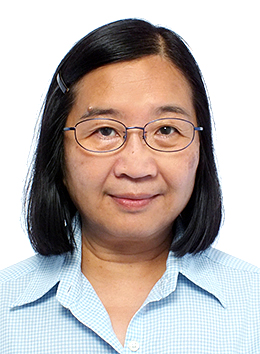Kei May LAU 劉紀美
Kei May LAU 劉紀美 Details

Tel
Office
Links
Google Scholar
ORCID
Scopus ID
Contact Information
Tel
Office
Links
Google Scholar
ORCID
Scopus ID
Research Interests
Biography
Prof Kei May Lau was born in Hong Kong and received all her pre-college education from the Pui Ching Middle School (K-12). She received the BS and MS degrees in physics from University of Minnesota, Minneapolis, in 1976 and 1977 respectively, and the PhD degree in Electrical Engineering from Rice University, Houston, Texas, in 1981.
From 1980 to 1982, she was a Senior Engineer at M/A-COM Gallium Arsenide Products, Inc., where she worked on epitaxial growth of GaAs for microwave devices, development of high-efficiency and mm-wave IMPATT diodes, and multi-wafer epitaxy by the chloride transport process. In the fall of 1982, she joined the faculty of the Electrical and Computer Engineering Department at the University of Massachusetts/Amherst, where she became a full professor in 1993. She initiated metalorganic chemical vapor deposition (MOCVD), compound semiconductor materials and devices programs at UMass. Her research group performed studies on heterostructures, quantum wells, strained-layers, III-V selective epitaxy, as well as high-frequency and photonic devices. Prof Lau spent her first sabbatical leave in 1989 at the MIT Lincoln Laboratory. She developed acoustic sensors at the DuPont Central Research and Development Laboratory in Wilmington, Delaware during her second sabbatical leave ('95-'96). In the fall of 1998, she was a visiting professor at the Hong Kong University of Science and Technology (HKUST), where she joined the regular faculty since the summer of 2000. She established the Photonics Technology Center for R&D efforts in wide-gap semiconductor materials and devices. She became a Chair Professor of Electronic and Computer Engineering at HKUST in July 2005.
Prof Lau is an IEEE Fellow, and a recipient of the National Science Foundation (NSF) Faculty Awards for Women (FAW) Scientists and Engineers. She served on the IEEE Electron Devices Society Administrative Committee and was an editor of the IEEE Transactions on Electron Devices (1996-2002). She also served on the Electronic Materials Committee of the Minerals, Metals and Materials Society (TMS) of AIME (American Institute of Materials Engineers).
Research Interests
Biography
Prof Kei May Lau was born in Hong Kong and received all her pre-college education from the Pui Ching Middle School (K-12). She received the BS and MS degrees in physics from University of Minnesota, Minneapolis, in 1976 and 1977 respectively, and the PhD degree in Electrical Engineering from Rice University, Houston, Texas, in 1981.
From 1980 to 1982, she was a Senior Engineer at M/A-COM Gallium Arsenide Products, Inc., where she worked on epitaxial growth of GaAs for microwave devices, development of high-efficiency and mm-wave IMPATT diodes, and multi-wafer epitaxy by the chloride transport process. In the fall of 1982, she joined the faculty of the Electrical and Computer Engineering Department at the University of Massachusetts/Amherst, where she became a full professor in 1993. She initiated metalorganic chemical vapor deposition (MOCVD), compound semiconductor materials and devices programs at UMass. Her research group performed studies on heterostructures, quantum wells, strained-layers, III-V selective epitaxy, as well as high-frequency and photonic devices. Prof Lau spent her first sabbatical leave in 1989 at the MIT Lincoln Laboratory. She developed acoustic sensors at the DuPont Central Research and Development Laboratory in Wilmington, Delaware during her second sabbatical leave ('95-'96). In the fall of 1998, she was a visiting professor at the Hong Kong University of Science and Technology (HKUST), where she joined the regular faculty since the summer of 2000. She established the Photonics Technology Center for R&D efforts in wide-gap semiconductor materials and devices. She became a Chair Professor of Electronic and Computer Engineering at HKUST in July 2005.
Prof Lau is an IEEE Fellow, and a recipient of the National Science Foundation (NSF) Faculty Awards for Women (FAW) Scientists and Engineers. She served on the IEEE Electron Devices Society Administrative Committee and was an editor of the IEEE Transactions on Electron Devices (1996-2002). She also served on the Electronic Materials Committee of the Minerals, Metals and Materials Society (TMS) of AIME (American Institute of Materials Engineers).
